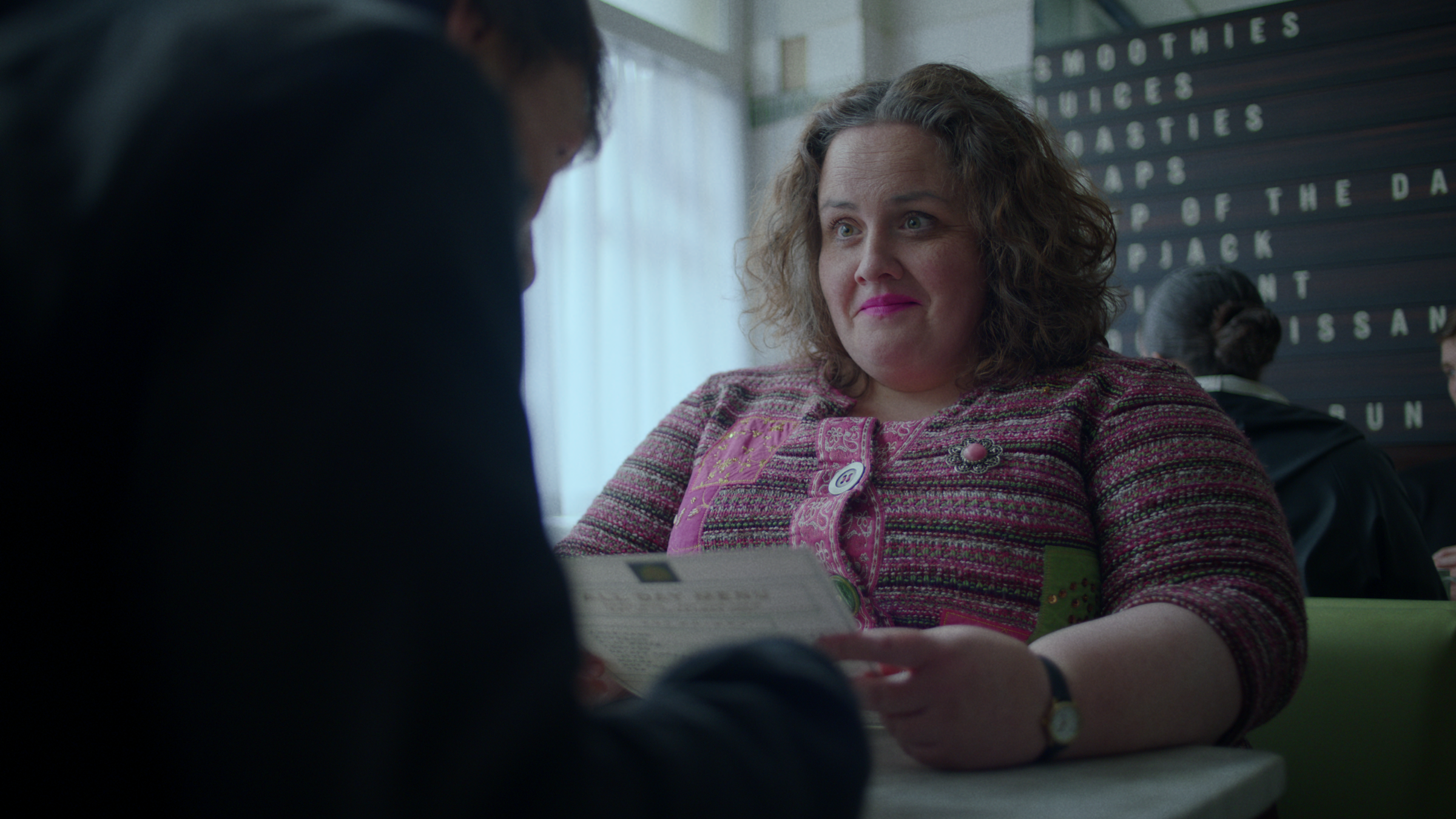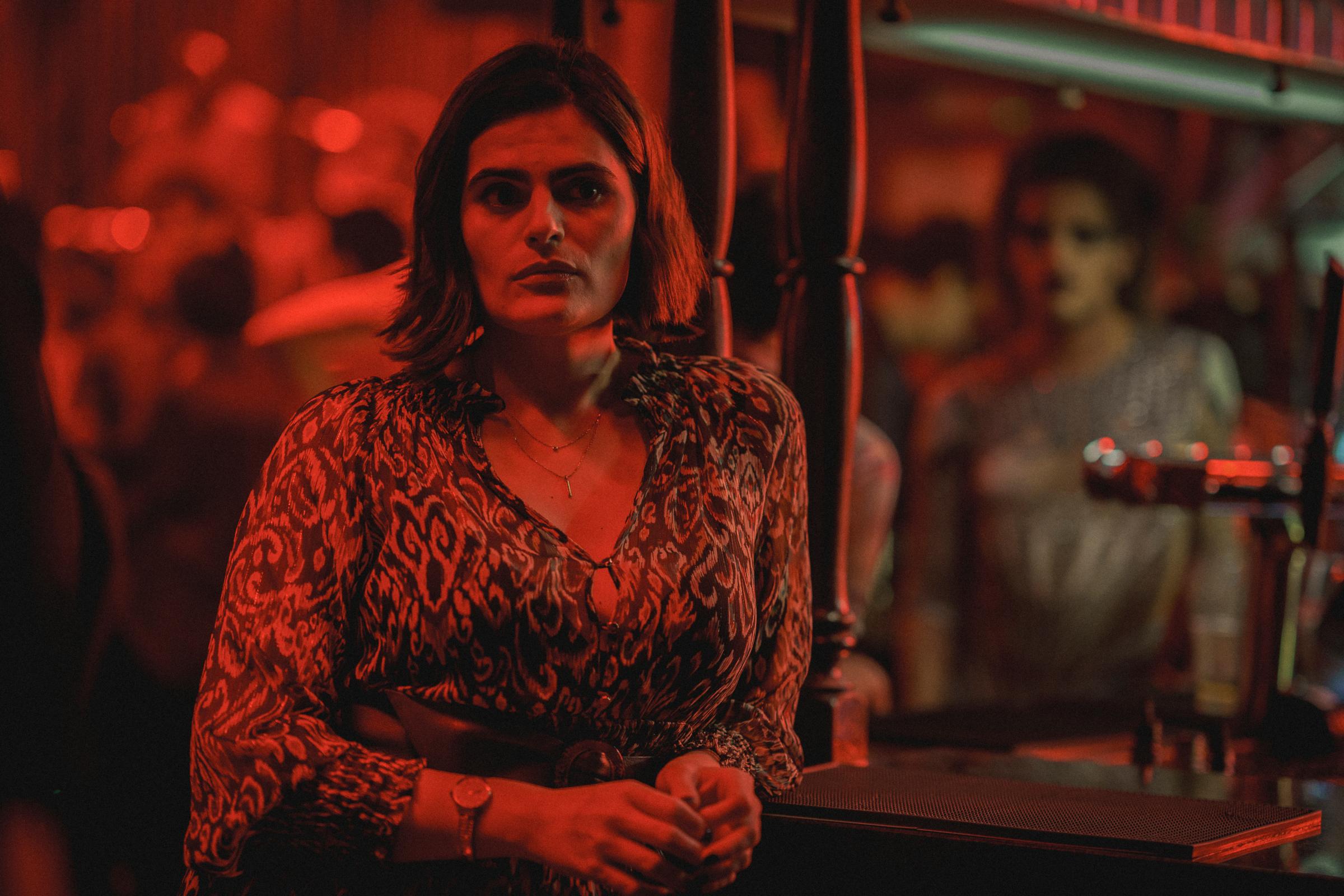Spoiler alert: This article discusses all episodes of Netflix's Baby Reindeer.
A woman walks into a London bar, crying softly, her eyes on the floor. She claims to be a powerful lawyer, but she also says she can’t afford a cup of tea. So the bartender, intrigued by this suddenly chatty enigma, gives her one on the house. This isn’t the setup for a joke, though the bartender happens to moonlight as a comedian. It’s an encounter that will soon escalate into the woman, Martha (Jessica Gunning), stalking the bartender, Donny (Richard Gadd). Their relationship forms the foundation of Netflix’s Baby Reindeer, a darkly comedic psychological thriller based on Gadd’s real-life ordeal and adapted from his award-winning one-man show.
At first, it seems as though we’re in for a type of TV series that has become far too popular in the streaming era: a true-crime drama, and more specifically one about a regular person who has their life ruined by some kind of monster with a human face. (See also: The Thing About Pam, Dirty John, A Friend of the Family.) In the premiere, Martha is made to look as dumpy and pathetic—and then as unhinged—as possible. I started to despair at the thought of yet another hit show (Baby Reindeer has zoomed to the No. 1 spot on Netflix’s TV top 10 list) that mined mental illness for cheap horror-comedy thrills. But Baby Reindeer turns out to be a murkier, more insightful, and sadder show than early scenes let on. It’s a Trojan Horse of sorts, drawing in viewers with the promise of schlock, then starting serious conversations, instead, about sexuality, abuse, shame, and how unprocessed trauma can poison even healthy relationships.

Martha’s stalking unfolds as you might expect. She becomes a regular at the bar. She finds Donny’s email address and sends hundreds of obsessive, bizarre, agrammatical messages. She turns up at his comedy shows, follows him home, comments on every single Facebook post he’s ever made. It doesn’t take him long to discover that she’s an old pro at this; newspaper articles detail her stalker resume. Yet as Martha’s behavior grows increasingly frightening—there are threats, things get physical—Donny does little to stop her. It takes him six months to walk into a police station, and even then, he neglects to mention that she’s groped him, attacked his girlfriend, and might well have the first name that comes up when you google stalker. “Why did I freeze?” he asks in voiceover narration. “Why did I just let it happen?” He’s referring to the moment when Martha sexually assaulted him one night, though he might as well be talking about their entire relationship up to that point.
These are the questions that truly fuel Baby Reindeer (which is titled after Martha’s nickname for Donny). The answers are nothing short of devastating. We learn Donny’s backstory slowly, and little of it adds up. He lives with the mother, Liz (Nina Sosanya), of his ex-girlfriend, Keeley (Shalom Brune-Franklin), who moved out when they broke up. He falls in love with a woman, Teri (Nava Mau), who he met on a trans dating site where his profile includes a fake name and bio; Martha knows who he really is, but, for a long time, he lies to Teri. (Lucky for him, she has the patience of the therapist she is. But it isn’t infinite.) In the harrowing fourth episode, we discover that, years ago, as a fledgling comedian bombing his first Edinburgh Fringe Festival engagement, he met a successful TV writer named Darrien (Tom Goodman-Hill). Darrien became Donny’s mentor, but instead of getting him work, he plied his so-called protégé with drugs like GHB, meth, and heroin, and raped him repeatedly, over the course of a series of benders, while he was intoxicated or passed out.

All of a sudden, Donny’s seemingly inexplicable behavior begins to make sense. He recounts how Darrien’s abuse forced him into a crisis of sexuality: “I started to feel this overwhelming sexual confusion crashing through my body.” So he self-medicated with anonymous, often dangerous sex, choosing partners of all identities. Teri is the first person, after his benders with Darrien ruin his relationship with Keeley, he really falls for. Yet the sexual dysfunction that followed the abuse and his fear of being judged as queer or perverted make Donny incapable of fully reciprocating her love. Teri rightly perceives that, while he’s closing parts of himself off to her, he’s getting something out of Martha’s stalking. “How do you identify, sexually?” she asks him. “Bi, maybe?” he replies. “Because I feel like a fraud no matter who I sleep with.”
Gadd goes deep into Donny’s crisis, never flinching as he wades through dark emotions. Yet this is not really a story where trauma gives way to redemption. Yes, Donny eventually has a career breakthrough, when a physical fight with Martha and a crowd that fails to respond to his hacky prop comedy drive him to confess his whole saga—stalking, Darrien, and all—onstage. He comes out as, well, not straight to parents who immediately accept him and learns, in a heartbreaking scene, that his father suffered sexual abuse while growing up in the Catholic Church. He finally gets the ammunition he needs to get Martha arrested, and she goes to jail.
But Baby Reindeer makes sure that we never see him as just an innocent victim or an empowered survivor. The extent to which Donny indulges Martha and prolongs their relationship, even after she’s hurt the people he cares most about, could make you queasy. There is no happy ending for Donny and Teri; by activating her old insecurities about her gender presentation, he has rendered their love impossible. The person he goes back to, instead, is Darrien. Maybe his original intention is to confront his abuser, but when Darrien offers him praise for the bravery of his viral breakdown video and offers him a paid writers’ room job, Donny accepts. Then he cues up some of Martha’s old voicemail messages, walks into a bar, orders a double vodka and Coke, tears up at her story about why she calls him Baby Reindeer, and discovers he has forgotten his wallet. “Don’t worry about it,” says the bartender. Echoing Donny and Martha's first meeting, he adds: “It’s on me."

It’s a full-circle ending whose sadness sneaks up on you. Gadd believes, I’m fairly sure, that people can change their lives for the better; it’s no small thing that Donny is embraced by his parents and welcomed back into Liz’s home. Yet it stings that predators like Darrien and Martha still have a place in his world—that he’s still actively choosing to, literally and figuratively, return to them. When he essentially becomes Martha in the series’ final moments, he isn’t exactly transforming into a stalker. But there’s symbolic resonance in the idea that cycles of abuse are self-perpetuating. We’ve watched Donny get hurt, but we’ve also watched him hurt people as he secretly nurses wounds he’s not ready to expose to sunlight. A Hollywood ending in which he transcended years of abuse to emerge as the picture of mental health would have been a lie.
That Baby Reindeer is able to get from its familiar premiere to this place of emotional honesty and profound insight, while bringing such a large audience along for the ride, is remarkable. It means that viewers who might not have tuned in for shows explicitly about rape, like I May Destroy You and Unbelievable, or the love lives of trans characters (Pose, Euphoria) or the blurriness of sexual orientation (Transparent, The Bisexual) are watching television that raises serious, nuanced questions about those topics. What’s more, it grounds those questions in the largely true tale of a straight-passing man—one told with a minimum of sanctimony and psychobabble. Stories like this are not just women’s stories. They’re not just monster stories. They’re human stories, which means that they are for—and about—all of us.
More Must-Reads from TIME
- Why Trump’s Message Worked on Latino Men
- What Trump’s Win Could Mean for Housing
- The 100 Must-Read Books of 2024
- Sleep Doctors Share the 1 Tip That’s Changed Their Lives
- Column: Let’s Bring Back Romance
- What It’s Like to Have Long COVID As a Kid
- FX’s Say Nothing Is the Must-Watch Political Thriller of 2024
- Merle Bombardieri Is Helping People Make the Baby Decision
Contact us at letters@time.com